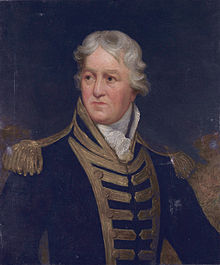Lord Barham
| The Lord Barham | |
|---|---|

Admiral Charles Middleton, later Lord Barham (Isaac Pocock)
|
|
| Born | 14 October 1726 Leith, Midlothian, Scotland |
| Died | 17 June 1813 (aged 86) Barham Court, Teston, Kent, England, UK |
| Allegiance |
|
| Service/ |
|
| Years of service | 1741–1813 |
| Rank | Admiral |
| Commands held | HMS Arundel HMS Emerald HMS Adventure |
| Battles/wars |
Seven Years' War American War of Independence French Revolutionary Wars Napoleonic Wars |
| Other work | abolitionist |
Admiral Charles Middleton, 1st Baron Barham PC (14 October 1726 – 17 June 1813) was a Royal Navy officer and politician. As a junior officer he saw action during the Seven Years' War. Middleton was given command of a guardship at the Nore, a Royal Navy anchorage in the Thames Estuary, at the start of the American War of Independence, and was subsequently appointed Comptroller of the Navy. He went on to be First Naval Lord and then First Lord of the Admiralty. Middleton also played a crucial role in the abolition of the slave trade.
He was born at Leith, Midlothian to Robert Middleton, a customs collector of Bo'ness, Linlithgowshire, and Helen, daughter of Captain Charles Dundas RN and granddaughter of Sir James Dundas of Arniston. He was a nephew of Brigadier-General John Middleton (1678–1739), a grandson of George Middleton DD, and a great-grandson of Alexander Middleton (younger brother of John Middleton, 1st Earl of Middleton), the last two having served as Principal of King's College, Aberdeen.
Middleton entered the Royal Navy in 1741 as captain's servant aboard HMS Sandwich and HMS Duke, and later served aboard HMS Flamborough as midshipman and master's mate. He became lieutenant in 1745, serving aboard the frigate HMS Chesterfield, after 1748 on the west Africa station.
...
Wikipedia
